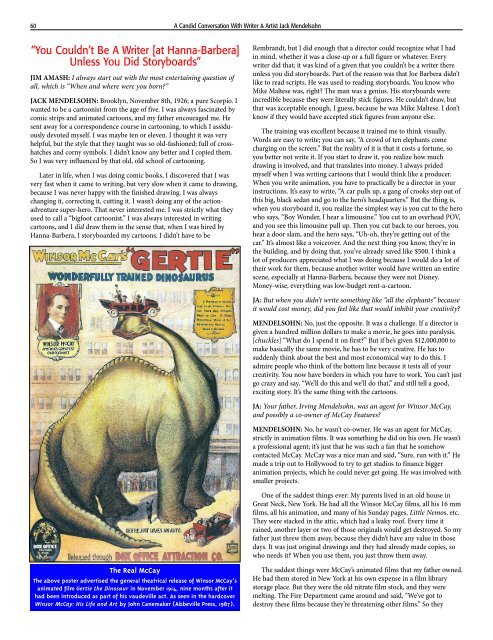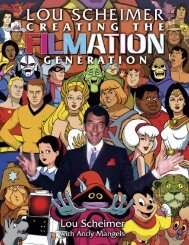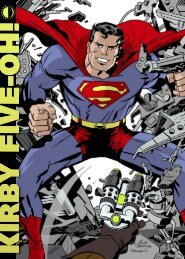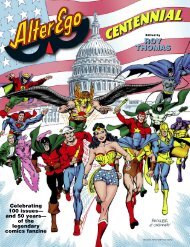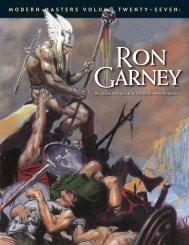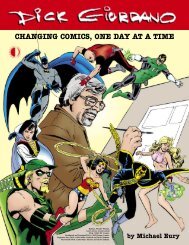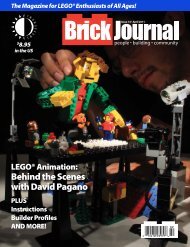The Education Of Victor Fox - TwoMorrows
The Education Of Victor Fox - TwoMorrows
The Education Of Victor Fox - TwoMorrows
You also want an ePaper? Increase the reach of your titles
YUMPU automatically turns print PDFs into web optimized ePapers that Google loves.
60 A Candid Conversation With Writer & Artist Jack Mendelsohn<br />
“You Couldn’t Be A Writer [at Hanna-Barbera]<br />
Unless You Did Storyboards”<br />
JIM AMASH: I always start out with the most entertaining question of<br />
all, which is “When and where were you born?”<br />
JACK MENDELSOHN: Brooklyn, November 8th, 1926; a pure Scorpio. I<br />
wanted to be a cartoonist from the age of five. I was always fascinated by<br />
comic strips and animated cartoons, and my father encouraged me. He<br />
sent away for a correspondence course in cartooning, to which I assiduously<br />
devoted myself. I was maybe ten or eleven. I thought it was very<br />
helpful, but the style that they taught was so old-fashioned; full of crosshatches<br />
and corny symbols. I didn’t know any better and I copied them.<br />
So I was very influenced by that old, old school of cartooning.<br />
Later in life, when I was doing comic books, I discovered that I was<br />
very fast when it came to writing, but very slow when it came to drawing,<br />
because I was never happy with the finished drawing. I was always<br />
changing it, correcting it, cutting it. I wasn’t doing any of the actionadventure<br />
super-hero. That never interested me. I was strictly what they<br />
used to call a “bigfoot cartoonist.” I was always interested in writing<br />
cartoons, and I did draw them in the sense that, when I was hired by<br />
Hanna-Barbera, I storyboarded my cartoons. I didn’t have to be<br />
Rembrandt, but I did enough that a director could recognize what I had<br />
in mind, whether it was a close-up or a full figure or whatever. Every<br />
writer did that; it was kind of a given that you couldn’t be a writer there<br />
unless you did storyboards. Part of the reason was that Joe Barbera didn’t<br />
like to read scripts. He was used to reading storyboards. You know who<br />
Mike Maltese was, right? <strong>The</strong> man was a genius. His storyboards were<br />
incredible because they were literally stick figures. He couldn’t draw, but<br />
that was acceptable enough, I guess, because he was Mike Maltese. I don’t<br />
know if they would have accepted stick figures from anyone else.<br />
<strong>The</strong> training was excellent because it trained me to think visually.<br />
Words are easy to write; you can say, “A crowd of ten elephants come<br />
charging on the screen.” But the reality of it is that it costs a fortune, so<br />
you better not write it. If you start to draw it, you realize how much<br />
drawing is involved, and that translates into money. I always prided<br />
myself when I was writing cartoons that I would think like a producer.<br />
When you write animation, you have to practically be a director in your<br />
instructions. It’s easy to write, “A car pulls up, a gang of crooks step out of<br />
this big, black sedan and go to the hero’s headquarters.” But the thing is,<br />
when you storyboard it, you realize the simplest way is you cut to the hero<br />
who says, “Boy Wonder, I hear a limousine.” You cut to an overhead POV,<br />
and you see this limousine pull up. <strong>The</strong>n you cut back to our heroes, you<br />
hear a door slam, and the hero says, “Uh-oh, they’re getting out of the<br />
car.” It’s almost like a voiceover. And the next thing you know, they’re in<br />
the building, and by doing that, you’ve already saved like $500. I think a<br />
lot of producers appreciated what I was doing because I would do a lot of<br />
their work for them, because another writer would have written an entire<br />
scene, especially at Hanna-Barbera, because they were not Disney.<br />
Money-wise, everything was low-budget rent-a-cartoon.<br />
JA: But when you didn’t write something like “all the elephants” because<br />
it would cost money, did you feel like that would inhibit your creativity?<br />
MENDELSOHN: No, just the opposite. It was a challenge. If a director is<br />
given a hundred million dollars to make a movie, he goes into paralysis.<br />
[chuckles] “What do I spend it on first?” But if he’s given $12,000,000 to<br />
make basically the same movie, he has to be very creative. He has to<br />
suddenly think about the best and most economical way to do this. I<br />
admire people who think of the bottom line because it tests all of your<br />
creativity. You now have borders in which you have to work. You can’t just<br />
go crazy and say, “We’ll do this and we’ll do that,” and still tell a good,<br />
exciting story. It’s the same thing with the cartoons.<br />
JA: Your father, Irving Mendelsohn, was an agent for Winsor McCay,<br />
and possibly a co-owner of McCay Features?<br />
MENDELSOHN: No, he wasn’t co-owner. He was an agent for McCay,<br />
strictly in animation films. It was something he did on his own. He wasn’t<br />
a professional agent; it’s just that he was such a fan that he somehow<br />
contacted McCay. McCay was a nice man and said, “Sure, run with it.” He<br />
made a trip out to Hollywood to try to get studios to finance bigger<br />
animation projects, which he could never get going. He was involved with<br />
smaller projects.<br />
One of the saddest things ever: My parents lived in an old house in<br />
Great Neck, New York. He had all the Winsor McCay films, all his 16 mm<br />
films, all his animation, and many of his Sunday pages, Little Nemos, etc.<br />
<strong>The</strong>y were stacked in the attic, which had a leaky roof. Every time it<br />
rained, another layer or two of those originals would get destroyed. So my<br />
father just threw them away, because they didn’t have any value in those<br />
days. It was just original drawings and they had already made copies, so<br />
who needs it? When you use them, you just throw them away.<br />
<strong>The</strong> Real McCay<br />
<strong>The</strong> above poster advertised the general theatrical release of Winsor McCay’s<br />
animated film Gertie the Dinosaur in November 1914, nine months after it<br />
had been introduced as part of his vaudeville act. As seen in the hardcover<br />
Winsor McCay: His Life and Art by John Canemaker (Abbeville Press, 1987).<br />
<strong>The</strong> saddest things were McCay’s animated films that my father owned.<br />
He had them stored in New York at his own expense in a film library<br />
storage place. But they were the old nitrate film stock, and they were<br />
melting. <strong>The</strong> Fire Department came around and said, “We’ve got to<br />
destroy these films because they’re threatening other films.” So they


